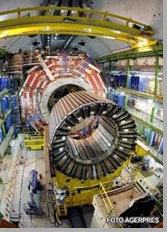
Live Webcast of Big Bang
The Live video Feed of Bang Bang Experiment by CERN can be viwed by clicking the link below
Live Webcast of Big Bang
LHC First Beam - 10th September 2008 - 9am CEST (GMT+2)
Due to a huge interest for this live video feed of the LHC First Beam day, you may not be able to see the live video stream and we apologise for this.
Please try reloading the page, come back later, or check the other connection options available on this page.
Big Bang 2: The milestone CERN experiment, step by step
 The most important scientific experiment in recent history starts officially on Wednesday morning when the biggest particle accelerator ever built becomes operational. Its purpose is to recreate what happened imediately after the Big Bang and thus help scientists to better understand universal processes. But the events involving the huge LHC particle accelerator today are just the start of a long period of collosal scientific efforts due to continue for years to come.
The most important scientific experiment in recent history starts officially on Wednesday morning when the biggest particle accelerator ever built becomes operational. Its purpose is to recreate what happened imediately after the Big Bang and thus help scientists to better understand universal processes. But the events involving the huge LHC particle accelerator today are just the start of a long period of collosal scientific efforts due to continue for years to come.
What happens today:
- In the morning, at 9.00 Geneva time, a quick planning session takes place at the European center for nuclear research (CERN), to be followed half an hour later by the injection of a first particle beam into the LHC accelerator. The event can be followed live at http://webcast.cern.ch/
- Scientists, engineers and even Nobel laureates are expected to make regular briefings and hold Q&A sessions throughout the day
- The purpose of the first day of the experiment is that the first particle beam fully circles the accelerator. Armies of experts will try to make sure everything goes fine as malfunctions can occur, given the complexity of the system
What will come next:
- After a first evaluation of this phase, another beam will be injected in reverse direction into the accelerator. This may happen in a few days time
- CERN representatives say the first collision of beams from opposite directions to take place no earlier than in six to eight months.
- The first collisions will have a low intensity which will increase gradually to reach a peak when hundreds of millions of collisions take place every second - the most important phase of the experiment, which has sparked speculations (strongly denied by scientists) about a so-called "end of the world"
- The LHC accelerator is due to be shut down for the winter period in mid-November and is expected to be restarted at full capacity next year
- The peta-bytes of data to be collected will be analyzed by some 5,000 scientists through a major computer grid for years to come.
